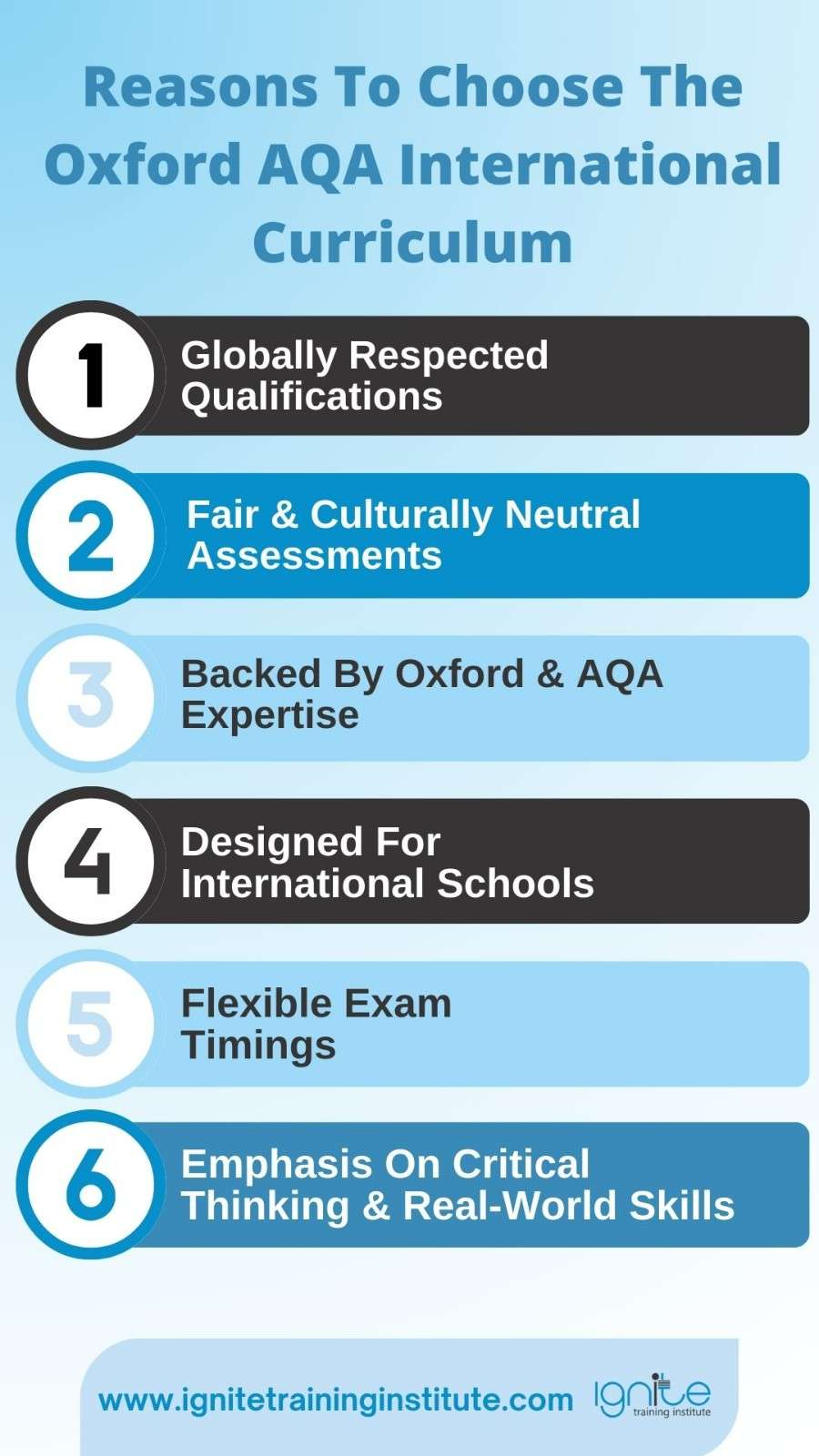When it comes to globally recognized British qualifications, OxfordAQA stands out as a premier choice for IGCSE and A-Level students worldwide. Designed specifically for international learners, OxfordAQA combines the academic rigor of the UK curriculum with fair and accessible assessments, ensuring that students are tested on their knowledge rather than cultural familiarity or complex language.
Backed by Oxford University Press and AQA, this qualification is widely accepted by top universities across the UK, US, Canada, and beyond.
For students in Dubai looking to excel in OxfordAQA IGCSE and A-Levels, Ignite Training Institute offers expert tutoring support. Our experienced educators provide personalized guidance, helping students master key concepts, refine exam techniques, and boost their confidence for high-stakes assessments.

What Is OxfordAQA?
OxfordAQA is an international examination board formed through a partnership between Oxford University Press (a department of the University of Oxford) and AQA, the UK’s largest provider of academic qualifications.
Established to offer globally relevant qualifications, OxfordAQA provides International GCSEs, AS, and A-levels designed to meet the educational needs of students aged 14 to 19 worldwide.
The qualifications offered by OxfordAQA are benchmarked to UK standards, ensuring academic rigor while focusing on assessing subject-specific abilities rather than language proficiency or cultural knowledge.
This approach aims to provide all students, regardless of their first language or cultural background, with a fair opportunity to demonstrate their knowledge and skills. By emphasizing critical thinking and problem-solving, OxfordAQA prepares students for success in higher education and their future careers.
In addition to offering qualifications, OxfordAQA supports educators by providing comprehensive teaching resources and professional development opportunities. These resources are designed to enhance teaching practices and improve student outcomes, reflecting OxfordAQA’s commitment to fostering lifelong learning and well-being in education.
Related: AQA VS CIE: A Closer Look Into The Examination Boards

OxfordAQA International Qualification – IGCSE & A-Levels
OxfordAQA International Qualifications for IGCSE and A-Levels offer a world-class British education tailored for international students. Designed with fair assessments and global accessibility, these qualifications are widely recognized by top universities worldwide.
OxfordAQA GCSE
OxfordAQA offers internationally recognized qualifications including International GCSEs (IGCSEs), AS, and A-Levels, designed for students aged 14 to 19. Developed by AQA, the UK’s leading exam board, in partnership with Oxford University Press, these qualifications uphold the high academic standards of the UK curriculum while being tailored to suit the needs of international learners.
They are especially known for their fairness in assessment – focusing on subject mastery rather than testing cultural familiarity or native-level English fluency.
OxfordAQA A-Levels
The OxfordAQA IGCSEs provide a strong foundation across a range of subjects and prepare students for advanced study. The courses emphasize critical thinking, practical application, and analytical skills.
Moving into OxfordAQA A-Levels, students dive deeper into subject specialization, gaining in-depth knowledge and independent learning abilities that are highly valued by universities around the world.
With rigorous but fair assessment methods and global recognition, OxfordAQA qualifications open doors to top universities and professional pathways across the UK, US, Canada, and beyond.
Related: What Is Cambridge Curriculum? A Complete 2025 Guide
AQA VS Oxford AQA: What’s The Difference?
When exploring UK-based qualifications, AQA and OxfordAQA often come up—but while they share a common foundation, they serve different student communities. Here’s a closer look at the key differences that set them apart.
1. Curriculum Focus
AQA qualifications are designed to align strictly with the UK national curriculum. They are primarily intended for students in schools and colleges across the United Kingdom. In contrast, OxfordAQA adapts this same UK-based curriculum to suit international learners.
While the academic standards remain equivalent, OxfordAQA qualifications are developed with global students in mind, offering international GCSEs and A-Levels that focus on clarity, accessibility, and relevance in a global context.
2. Assessment Style
One of the most important differences lies in the way assessments are constructed. AQA assessments are created for native English speakers and often include cultural references or contexts familiar to UK students. OxfordAQA assessments, however, are intentionally designed to remove cultural bias and reduce the reliance on native-level English.
This ensures that students from diverse backgrounds can focus on demonstrating their subject knowledge and skills, rather than navigating unfamiliar cultural scenarios or complex language.
3. Target Audience & Recognition
AQA serves a UK-based student population, and its qualifications are well-established across British schools. OxfordAQA, on the other hand, is aimed at international schools and students who want to pursue a UK-style education while studying in other countries.
Both qualifications are recognized by top universities globally, including those in the UK, US, Canada, and beyond. However, OxfordAQA’s global emphasis and fairer assessments make it particularly attractive to international students planning to apply to world-class universities.
4. Support & Resources
While AQA offers extensive teacher and learner support for UK educators, OxfordAQA provides tailored resources, professional development, and training for international teachers. These are developed in partnership with Oxford University Press, ensuring that educators have high-quality materials that are aligned with international needs and teaching environments.
5. Exam Availability
AQA exams are scheduled according to the UK academic calendar, typically with sessions in May/June and sometimes January, primarily catering to UK-based students.
OxfordAQA, however, offers greater flexibility for international schools with two exam sittings per year – in May/June and November – allowing students and schools across different countries to plan assessments around their academic calendars. This flexibility is a major advantage for international students managing timelines for university admissions or academic transitions.
6. Qualification Design & Accessibility
While both AQA and OxfordAQA maintain academic rigor, OxfordAQA places a greater emphasis on accessibility and fairness in qualification design. Exam questions are clearly worded, free from idiomatic expressions, and aim to test a student’s understanding of the subject rather than their language skills or cultural background.
This makes OxfordAQA particularly suitable for students whose first language is not English, ensuring they are assessed based on what they know – not how well they interpret complex language.
Related: Why Choose Cambridge? 10 Must-Know Reasons For Students
Oxford AQA Grade Boundaries
Grade boundaries are the minimum marks required to achieve specific grades in examinations. At OxfordAQA, these boundaries are established post-examination to ensure fairness and consistency across different exam sessions. This process accounts for variations in exam difficulty, ensuring that a student’s performance is evaluated equitably, regardless of when they took the exam.
For instance, in the June 2024 International GCSE Biology exam, the grade boundary for a Grade 9 was set at 61 out of 90 marks for Paper 1. Similarly, for International A-Level Biology Unit 1, a Grade A required a minimum of 52 out of 75 marks in the same exam series.
These grade boundaries are made available on results day and can be accessed through the OxfordAQA website. Educators and students are encouraged to consult these boundaries alongside the provided standards-setting guidance to fully understand the assessment criteria.
Related: What Is The Difference Between Edexcel & Cambridge? 5 Facts
Reasons To Choose The Oxford AQA International Curriculum

The OxfordAQA International Curriculum stands out as a globally recognized and academically rigorous pathway for students who want to pursue a world-class education with UK standards.
Designed specifically for international learners, it offers GCSEs, AS, and A-Levels that balance subject mastery with fairness in assessment. Here are some compelling reasons why schools and students across the world choose OxfordAQA:
1. Globally Respected Qualifications
OxfordAQA qualifications are benchmarked to UK standards and accepted by top universities worldwide, including those in the UK, US, Canada, Europe, and the Middle East. They give students a competitive edge when applying for higher education and global career opportunities.
2. Fair & Culturally Neutral Assessments
Unlike many traditional exams, OxfordAQA assessments are crafted to remove unnecessary cultural context and language complexity. This ensures that international students are tested on their knowledge—not their familiarity with UK culture or native-level English.
3. Backed By Oxford & AQA Expertise
OxfordAQA is a collaboration between two trusted names—Oxford University Press and AQA (the UK’s largest exam board). This partnership ensures a strong academic foundation, robust quality control, and high standards in exam development.
4. Designed For International Schools
Every aspect of the OxfordAQA curriculum is tailored for international teaching environments. It includes comprehensive support for educators, including teaching resources, training, and accessible content that suits a diverse classroom.
5. Flexible Exam Timings
OxfordAQA offers two exam sessions annually—in May/June and November—providing flexibility for schools and students to plan around local academic calendars or university admission deadlines.
6. Emphasis On Critical Thinking & Real-World Skills
The curriculum promotes deeper learning by focusing on analytical skills, problem-solving, and independent thinking—skills that are crucial for university success and life beyond academics.
Related: 10 Proven Strategies On How To Study For IGCSE Exams & Excel
Study Tips To Excel In Oxford AQA Curriculum
Succeeding in the OxfordAQA International GCSE and A-Level curriculum requires more than just hard work—it calls for smart study strategies that align with how the exams are structured and assessed. Here are some practical, actionable tips that can help students perform at their best:
1. Understand The Assessment Objectives
Each OxfordAQA subject has specific assessment objectives (AOs), such as knowledge recall, application, analysis, and evaluation. Review your syllabus and mark schemes to understand what examiners are looking for. Tailor your revision and answers to meet these objectives directly.
2. Use Past Papers Strategically
Practice with OxfordAQA past papers under timed conditions to get used to the structure and question style. Don’t just complete them—mark your answers using official mark schemes to see where you’re gaining or losing marks, and focus on improving those weak areas.
3. Focus On Clarity & Structure In Writing
OxfordAQA places emphasis on clear, concise, and well-structured responses, especially in written subjects. Practice planning your answers, using bullet points or short outlines before writing full answers. Use PEEL (Point, Evidence, Explanation, Link) or similar structures to make your arguments more effective.
4. Build A Conceptual Understanding
Avoid rote memorization—OxfordAQA exams often test your ability to apply knowledge in new contexts. Use concept maps, explain topics to a peer, or teach them aloud to strengthen your understanding. The better you understand the “why” behind a topic, the easier it will be to apply it.
5. Practice Active Recall & Spaced Repetition
Use flashcards (physical or digital via apps like Anki or Quizlet) to actively test your memory. Space out your revision over weeks rather than cramming everything in one go. This technique improves long-term retention and recall during exams.
6. Ask For Feedback Often
Don’t just study alone. Share your essays, past paper answers, or problem solutions with your teachers or tutors and ask for specific feedback. Understanding where and why you lost marks can be a game-changer in improving exam technique.
7. Master Time Management
Create a study schedule that breaks subjects into manageable chunks. In exams, practice allocating time per question or per mark—e.g., if a paper is worth 100 marks in 2 hours, aim to spend just over 1 minute per mark.
8. Stay Organized With Notes & Resources
Keep all your notes, past paper questions, and revision materials organized by topic and subject. Use folders, notebooks, or digital tools like Notion or Google Drive to avoid last-minute chaos before exams.
Related: Pearson Edexcel IGCSE: Subjects, Grades, & Popular Facts.
Ignite Training Institute: Oxford AQA IGCSE & A-Levels Tutors In Dubai
Looking for expert support in AQA IGCSE and A-Level subjects? Ignite Training Institute in Dubai offers specialized tutoring for students following the AQA and OxfordAQA curriculum, helping them master their subjects and achieve top grades with confidence.
Our experienced tutors are well-versed in the UK curriculum and provide tailored academic support that aligns with the latest AQA specifications.
At Ignite, we go beyond traditional teaching methods. Our AQA IGCSE and A-Level programs focus on building strong conceptual understanding, refining exam techniques, and improving time management skills—key to succeeding in these rigorous qualifications.
Whether you’re aiming for a Grade 9 in GCSEs or an A* at A-Level, our tutors guide you through detailed content explanations, past paper practice, and real-time feedback to boost your performance.
Related: 5 Differences Between GCSE & A-Levels: Facts To Know
FAQs
1. What is OxfordAQA?
OxfordAQA is an international exam board offering UK-based IGCSEs and A-Levels, specifically designed for international students. It’s a joint venture between Oxford University Press and AQA.
2. Is OxfordAQA the same as AQA?
Not exactly. While both follow the same UK academic standards, OxfordAQA is tailored for international students with more culturally neutral assessments and accessible language.
3. Are OxfordAQA qualifications accepted by universities?
Yes, OxfordAQA IGCSE and A-Level qualifications are recognized by top universities worldwide, including those in the UK, US, Canada, and the Middle East.
4. What subjects are available under OxfordAQA?
OxfordAQA offers a wide range of IGCSE and A-Level subjects, including Mathematics, Sciences, English, Business, Economics, Psychology, and more.
5. What are the grade boundaries for OxfordAQA?
Grade boundaries vary by subject and exam session and are published after each series to ensure fair results. They can be found on the OxfordAQA official website.
6. Can I take OxfordAQA exams in Dubai?
Yes, many international schools and exam centers in Dubai offer OxfordAQA exams. You can register as a private candidate or through your school.
7. How can Ignite Training Institute help with AQA exams?
Ignite provides expert tutoring for AQA and OxfordAQA IGCSEs and A-Levels, including exam strategies, past paper practice, and personalized academic support.
8. What’s the difference between OxfordAQA and Cambridge IGCSE?
Both are international qualifications, but OxfordAQA aligns closely with UK AQA standards and focuses on fairness and accessibility for global learners, with less cultural bias.
9. When are OxfordAQA exams held?
Exams are usually offered twice a year—in May/June and November—providing flexibility for international academic calendars.
10. What’s the difference between OxfordAQA and Cambridge IGCSE?
Both are international qualifications, but OxfordAQA aligns closely with UK AQA standards and focuses on fairness and accessibility for global learners, with less cultural bias.
11. When are OxfordAQA exams held?
Exams are usually offered twice a year—in May/June and November—providing flexibility for international academic calendars.
12. Does Ignite offer 1-on-1 tutoring for OxfordAQA students?
Yes, Ignite offers both personalized 1-on-1 sessions and small group classes tailored to students’ needs and subject requirements.
Conclusion

OxfordAQA offers a globally recognized, academically rigorous, and student-friendly curriculum that prepares learners for success in higher education and beyond. With its fair assessment approach, culturally neutral exam structure, and strong foundation in critical thinking, it provides an excellent alternative for international students seeking UK-based qualifications.
Related: Cambridge IGCSE: Comprehensive Guide For Parents & Students


